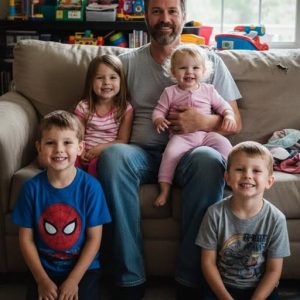Marcus’s journey from shock and heartbreak to unwavering support and reaffirmed fatherhood is incredibly moving. The story explores the emotional depth of betrayal, trust, and the power of presence over biology. When Marcus discovers the truth about his wife’s past infidelity and the possibility that Mia might not be his biological daughter, his world begins to unravel. Yet, instead of turning away, he leans into love—choosing to be there for Mia, protecting her emotionally and legally. His actions show that being a parent is about commitment, not DNA, and that the strongest bonds are forged through care, not just blood.
The narrative highlights how children often carry silent burdens, as Mia did for years, and how healing can begin once truth and safety are restored. From courtroom revelations to quiet moments over takeout and laughter, Marcus rebuilds a home grounded in love and trust. Mia’s essay—likening her father to a locked front door that makes her feel safe—captures the heart of the story. In the end, this is a testament to resilience and the idea that, even after the deepest pain, hope and connection can still grow.




